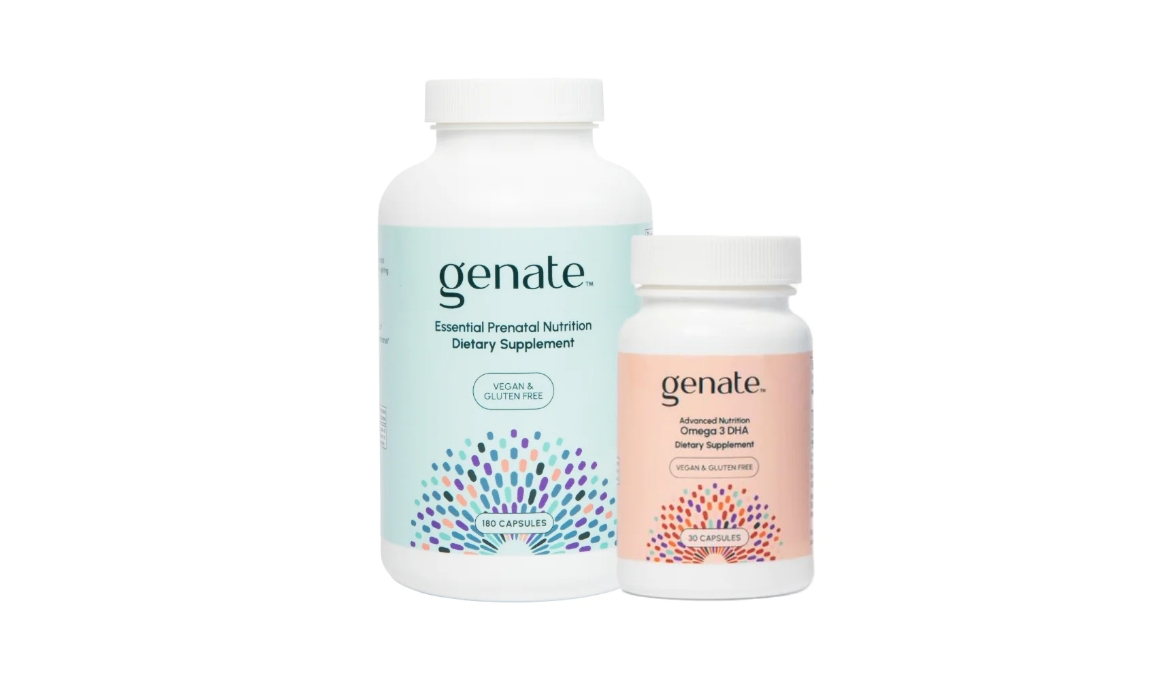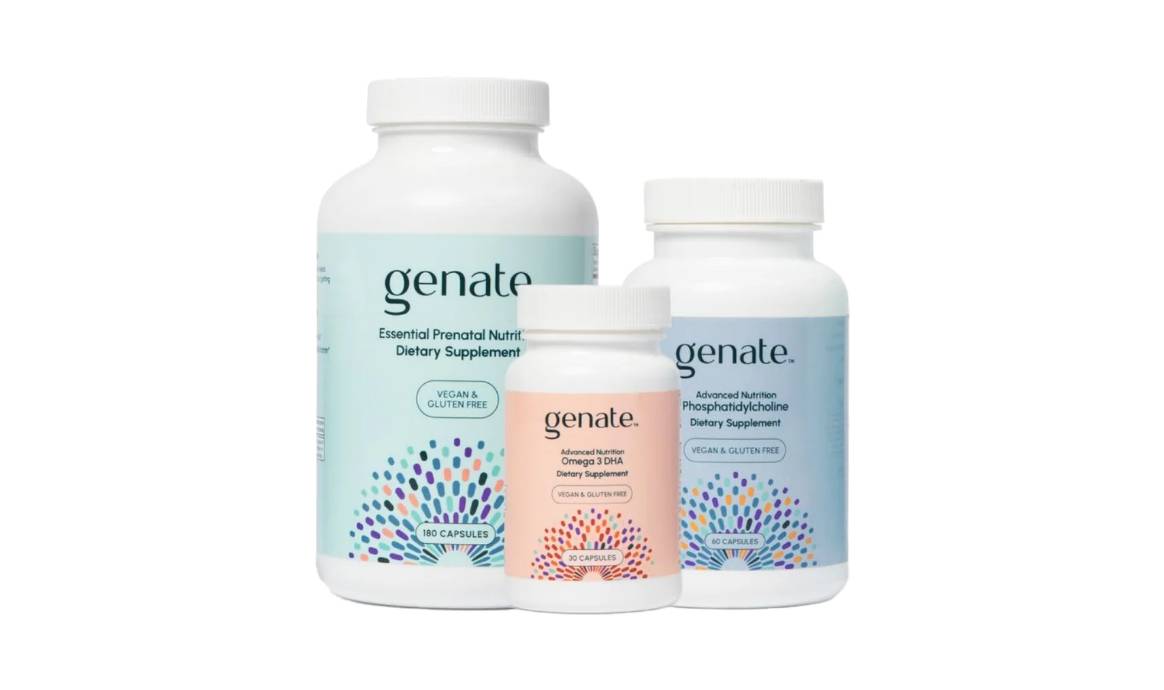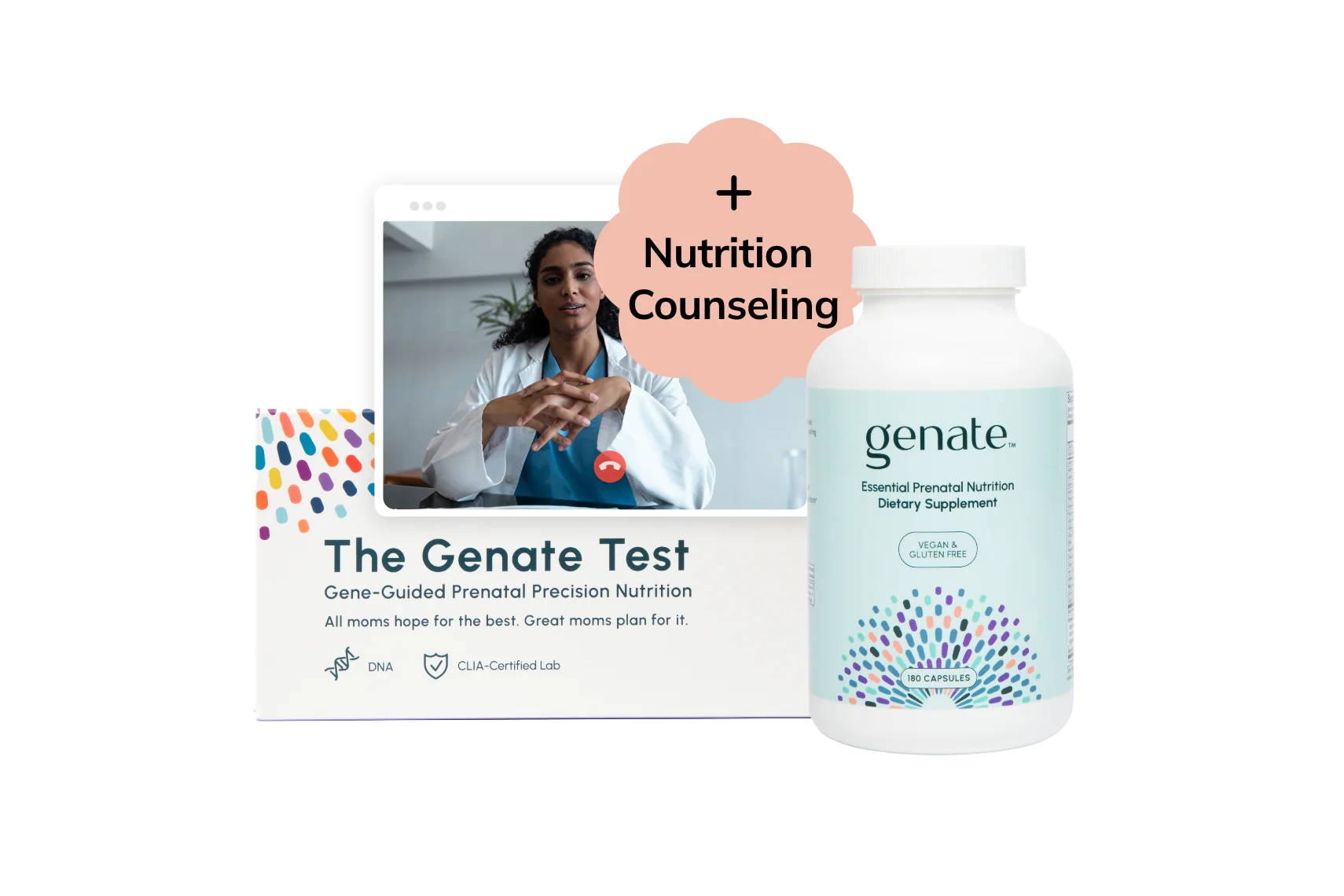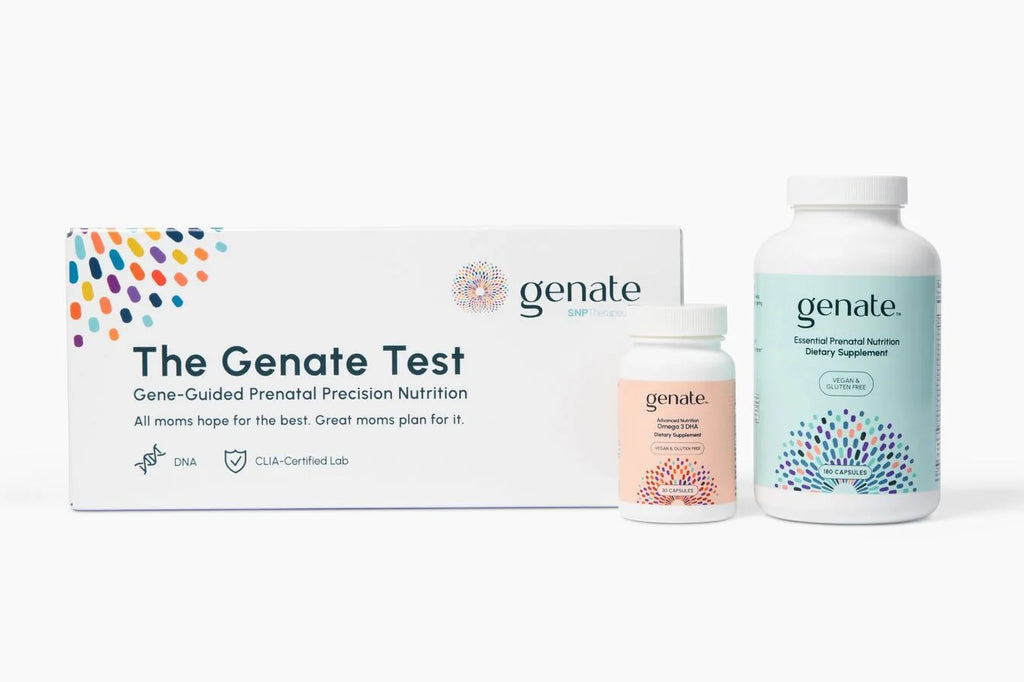There is no daily recommended intake of phosphatidylcholine (PC), but levels up to 24,000 mg per day are thought to be safe. In order to meet the recommended daily intake for choline with PC supplements, you would need roughly 3,000 mg PC before pregnancy and 3,200 mg PC during pregnancy.
PRENATALS
How Much Choline Is Needed for Pregnancy?
by Cara Everett, MS, RDN, LDN • June 5, 2024 • 6-7 minute read
Choline isn’t optional when you’re pregnant and breastfeeding—it’s essential. Read on to learn why this nutrient is critical for both you and your baby, how much choline you need for pregnancy and lactation, and symptoms of choline deficiency.
Key Takeaways
- Choline is a one-carbon nutrient that plays key roles in your baby’s brain and spinal cord development during pregnancy and breastfeeding.
- Recommended daily choline intake for women is 450 mg during pregnancy and 550 mg during breastfeeding.
- Choline deficiency has been linked to neural tube defects, behavioral problems, and poor cognitive development in babies. Low choline can also lead to muscle weakness, liver inflammation, and postpartum depression.
- Genetics impacts your body’s production of choline and how it responds to a diet low in choline.
Discover the genetics that affect your baby's cognitive development
To support their baby’s growth throughout pregnancy, expecting moms need to eat a wide variety of nutrients every day. Folate, iron, and calcium are just a few that you’re probably aware of. But did you know that few nutrients are as important in pregnancy as choline? This article covers the importance of choline for fetal development, how much you need during pregnancy, and ways to make sure you’re getting enough.
The Importance of Choline in Pregnancy
According to the American College of Obstetricians and Gynecologists (ACOG) and the National Institutes of Health, choline is one of the most important nutrients for a healthy pregnancy. Both choline and another one-carbon nutrient, folate, support the division of stem cells and neural tube development in early pregnancy. The neural tube serves as the foundation for the brain and spinal cord, and a deficiency in either choline or folate can lead to neural tube defects. Choline also plays a vital role in your baby’s brain growth by helping form neural synapses so brain cells can communicate with each other and the rest of the body.[1]
Camille Hoffman, MD, MSc, Professor of Maternal and Fetal Medicine at the University of Colorado School of Medicine, researches the impact of choline on the health of pregnant women and their babies. She says that the vital role of this nutrient in pregnancy can’t be overstated.
“Choline is most critical in prenatal life because it's such an important part of brain growth, synapse formation, and nerve cell communication.”
In addition to neural tube formation, your baby needs choline for the following processes:
- Brain growth and function
- Neurotransmitter production
- Cell membrane synthesis
- DNA methylation
Choline also promotes maternal health by supporting the placenta and reducing the risks of preeclampsia and preterm birth.[2] Hoffman’s research has found that Black American pregnant women with lower choline levels have higher amounts of cortisol (an indication of stress), as well as babies who are more likely to be born preterm and less able to self-regulate.[3]
How Much Choline Do I Need During Pregnancy?
According to the Dietary Guidelines for Americans, pregnant women should consume 450 mg of choline per day from food and/or supplements (compared to 425 mg per day for non-pregnant women).[4] Choline needs rise during pregnancy because your baby’s brain and nervous system, along with their nerve cells and DNA, need high amounts of it for every one of those functions.
How Much Choline Do I Need While Breastfeeding?
Choline requirements go up even more during the breastfeeding period to 550 mg per day. Your baby’s brain grows at the fastest rate of their life from the first day of conception until their third birthday.[5] To grow well, they need high levels of brain-building nutrients like choline and the omega-3 fat DHA.
How Much Choline Is Too Much?
It is possible to consume too much choline. The tolerable upper limit (TUL) for choline in adults (both pregnant and non-pregnant) is 3,500 mg per day. Intakes above this level can lead to a fishy body odor, salivation, low blood pressure, nausea and vomiting, and liver damage.[6] The side effects of choline supplements are similar to symptoms of excess choline intake and are seen with high-dose supplements.
Choline Deficiency: Tests & Symptoms
Because our bodies can make some of the choline we need, many people don’t show symptoms of deficiency until their blood levels of choline are significantly low.[6] In that case, they may develop muscle or liver damage and fatty deposits in their liver (known as MASLD).[7]
Genetic research has found that common misspellings (called SNPs) in the gene responsible for one of the main pathways of choline metabolism predispose people to muscle and liver damage when they eat a low-choline diet. The Genate Test evaluates this gene (called PEMT) and eleven other genes in one-carbon nutrient pathways. The results can identify specific nutrients that you need to focus on to prevent deficiencies and the health problems they can cause. This is important at all life stages, but it’s critically important in pregnancy because it affects not only your health but also that of your baby.

How to Get More Choline in Your Diet
You have several options for adding choline to your diet. Many foods are good sources of choline, with animal foods tending to be higher in choline than plant foods. The table below outlines some of the best sources.
Food
Serving Size
Choline (mg)
Beef liver*
3 ounces
367
Salmon
3 ounces
187
Caviar (roe)
2 tablespoons
158
Egg
1 large
147
Beef roast, top round
3 ounces
117
Soy
½ block tofu or ½ cup soybeans
107
Ground beef, 93% lean
3 ounces
107
Chicken
3 ounces
72
*Not a safe food in pregnancy
Pregnant women should not consume beef liver due to its high content of preformed vitamin A (approximately 8,000 mcg per 3-ounce serving). The National Institutes of Health notes that preformed vitamin A can be toxic to fetuses at levels above 3,000 mcg per day.[6] Many women find it hard to get enough choline from other food sources during pregnancy as well, due to nausea and/or food aversions. For example, the smell and taste of meat, seafood, and eggs can be hard to tolerate for some women.
Thankfully, you can also get choline from supplements. Unfortunately, most prenatal vitamins don’t contain choline. The Genate Essential Prenatal Multivitamin is one of the only brands to provide 450 mg of choline, 100% of the recommended daily amount in pregnancy. Genate also offers Advanced Phosphatidylcholine, with 1800 mg phosphatidylcholine per serving (252 mg choline) for women who are not getting enough in their diet.
What is Phosphatidylcholine?
Phosphatidylcholine (PC) is a compound very similar to choline. It can be made from choline and can also be used to produce choline. Chemically, PC is a phospholipid attached to a choline molecule. It’s used primarily for two purposes:
- To aid in fat metabolism and transport of fats out of the liver to tissues and organs for use or storage
- As a major component of cell membranes[8]
In addition to its production from choline, PC is also made through the PEMT pathway discussed above. When estrogen rises in pregnancy, it turns on the PEMT gene to tell the body to make more PC for both mom and baby. But women who have one or more misspellings (SNPs) in their PEMT gene can’t make enough PC to meet their needs or those of their babies. These women need more PC from their diet and supplements to make up the difference. The only way to know if you have SNPs affecting your body’s PC production is to take a genetic test.
How Genate Can Help You Understand Your Choline Needs
The Genate Test is the only prenatal genetic screening test to help women understand how their genes impact their nutrient metabolism in pregnancy. By identifying variants called single nucleotide polymorphisms (SNPs) in the genes that code for enzymes in one-carbon nutrient pathways, the Genate Test can help women determine whether they need more of certain nutrients and/or specific nutrient forms for maximum absorption.
Genate’s registered dietitians provide nutrigenetic counseling to help clients interpret their test reports and create a precision nutrition plan tailored to their preferences, health concerns, and genetics.
Bottom Line
Choline is a vital part of any healthy pregnancy diet and supplement plan. Its roles in brain development, cell membrane structure, and DNA formation can’t be replaced by any other nutrient. A balanced diet with a variety of animal and plant foods can help ensure that you’re getting enough choline for you and your baby.
If your diet is falling short, a comprehensive prenatal multivitamin with 450 mg choline can make sure you get what you need. Talking with your healthcare provider and/or a registered dietitian for guidance on your nutrition requirements can give you tailored care that meets your unique needs.
This article is not intended as medical advice to treat or diagnose any health condition but rather as educational health information for the general public. It should not be used as a substitute for individualized medical care from your healthcare provider.
Shop the Article
Save 23% today!
Genate Essential Prenatal Multivitamin + Advanced Omega-3 DHA Package
Bundle to increase savings and provide the foundational nutrients needed for optimal health and development.
From $72 per month
Save 23% today!
Comprehensive Prenatal Support Package
Genate Essential Prenatal Multivitamin + Advanced Omega-3 DHA + Phosphatidylcholine
Our most comprehensive bundle - you’ll receive our Essential Prenatal Multivitamin, Advanced Phosphatidylcholine, and Advanced Omega-3 DHA.
From $110 per month
Save 30% today!
Comprehensive Prenatal Nutrition Bundle
Buy the Genate Test and a nutrition counseling session with a Genate registered dietitian, and receive a 30-day supply of the Genate Essential Prenatal Multivitamin FREE. Purchase includes a 90-day prenatal multivitamin subscription at our best monthly price.
$309

About Cara Everett, MS, RDN, LDN
Cara is a registered dietitian nutritionist with a passion for helping people optimize their health with sustainable diet and lifestyle changes. She provides nutrition counseling to clients of all ages, with specialties in nutrigenetics, women's health, and chronic medical conditions.
Cara is also a health writer and editor with over 20 years of experience creating content for print and digital media outlets, nutrition and wellness blogs, and medical white papers. Her work has been featured on websites such as the National Council on Aging, Everyday Health, HelpGuide, MarketWatch, and Verywell. Cara's current writing covers women's nutrition and nutrigenetics in pregnancy and lactation.
As lead dietitian for SNP Therapeutics, Cara shapes content strategy, medically reviews and edits articles, and provides gene-focused medical nutrition therapy for clients. She holds Bachelor of Science and Master of Science degrees in Nutrition from Texas A&M University and completed her dietetic internship at the University of Kentucky Hospital.
References
- Jaiswal A, Dewani D, Reddy LS, Patel A. Choline supplementation in pregnancy: Current evidence and implications. Cureus. 2023;15(11):e48538. https://doi.org/10.7759/cureus.48538
- Korsmo HW, Jiang X, Caudill MA. Choline: exploring the growing science on its benefits for moms and babies. Nutrients. 2019;11(8):1823. https://doi.org/10.3390/nu11081823
- Hunter SK, Hoffman MC, McCarthy L, D'Alessandro A, Wyrwa A, Noonan K, et al. Black American maternal prenatal choline, offspring gestational age at birth, and developmental predisposition to mental illness. Schizophr Bull. 2021;47(4):896-905. https://doi.org/10.1093/schbul/sbaa171
- United States Department of Agriculture. (2020). Dietary guidelines for Americans 2020-2025. https://www.dietaryguidelines.gov/sites/default/files/2020-12/Dietary_Guidelines_for_Americans_2020-2025.pdf
- First Things First. Brain Development. https://www.firstthingsfirst.org/early-childhood-matters/brain-development/ Accessed May 28, 2024.
- National Institutes of Health. Choline. https://ods.od.nih.gov/factsheets/Choline-Consumer/ Published June 2, 2022. Accessed May 26, 2024.
- Cleveland Clinic. Metabolic-Associated Steatotic Liver Disease. https://my.clevelandclinic.org/health/diseases/22437-non-alcoholic-fatty-liver-disease Updated February 5, 2022. Accessed May 28, 2024.
- van der Veen JN, Kennelly JP, Wan S, Vance JE, Vance DE, Jacobs RL. The critical role of phosphatidylcholine and phosphatidylethanolamine metabolism in health and disease. BBA- Biomembranes. 2017;1859(9B):1558-1572. https://doi.org/10.1016/j.bbamem.2017.04.006
Take the Genate Quiz
Take our Nutrition Quiz to learn more about your nutrition journey.
Read Our Latest Articles
Frequently Asked Questions
How much phosphatidylcholine do I need every day?
What should my choline supplement dosage be during pregnancy?
The adequate intake (AI) for choline during pregnancy is 450 mg.
How much choline do I need while breastfeeding?
The adequate intake (AI) for choline while breastfeeding is 550 mg.
What are the side effects of choline?
Choline generally does not produce side effects, but exceeding the tolerable upper limit of 3,500 mg/day can result in a fishy body odor, salivation, low blood pressure, nausea and vomiting, and liver damage.
Can I take too much choline?
It’s recommended not to exceed a daily intake of 3,500 mg choline.








